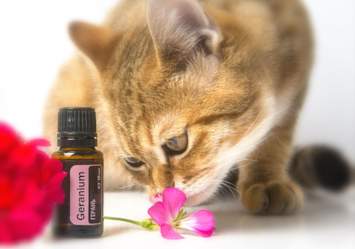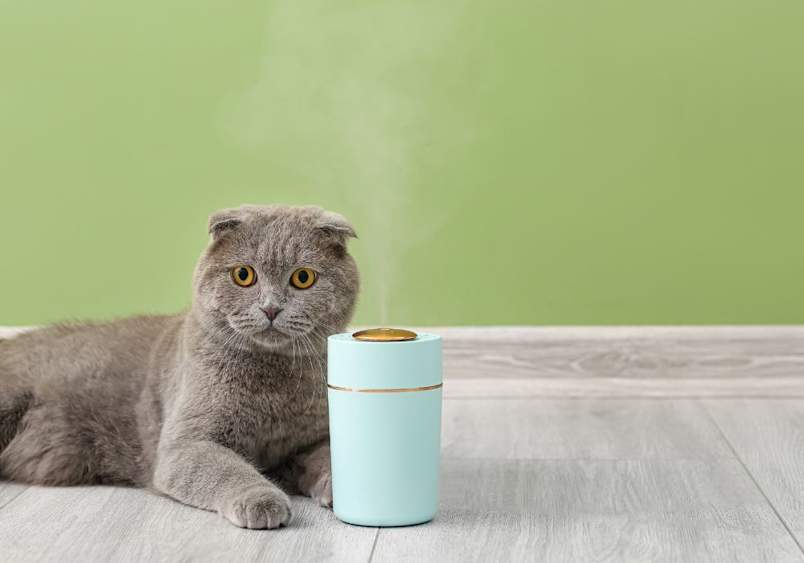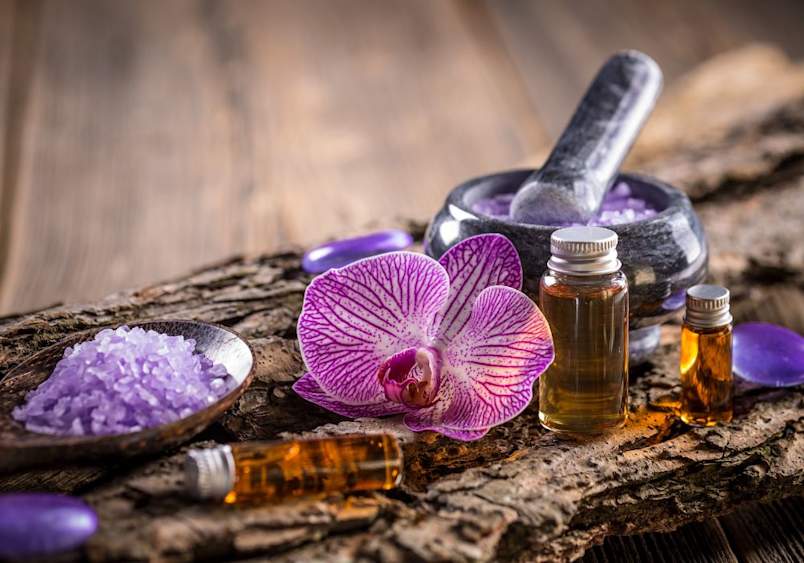
Have you ever enjoyed the soothing aroma of your essential oil diffuser, only to wonder if your feline friend is enjoying it too—or worse, if it might be harmful? You're not alone. As cat parents, we want to experience the benefits of essential oils while keeping our pets safe. With so much conflicting information online about essential oils and cats, it's hard to know what to trust. The truth is that cats are uniquely sensitive to essential oils, but that doesn't mean you have to abandon your aromatherapy altogether.
In this guide, we’ll help you understand which essential oils are safe for cats, which to avoid (like lemon oil), and how to protect your feline friend while still enjoying a fresh, inviting home.
What Are Essential Oils?
Essential oils are highly concentrated plant extracts that capture the plant's scent, flavor, or "essence." These potent substances are extracted through methods like steam distillation or cold pressing, resulting in oils that can be 50-100 times more concentrated than the plants they come from.
These volatile aromatic compounds are produced by plants and even some animals for various natural purposes – attracting pollinators, repelling predators, fighting microbes, or even attracting mates. What makes them "volatile" is their ability to rapidly transform from solid to liquid to vapor, which is why they emit such powerful fragrances.
While most people associate essential oils with pleasant aromas in perfumes or cleaning products, they serve many purposes beyond fragrance. For centuries, various cultures have utilized the medicinal properties of essential oils, creating a rich history of aromatherapy and natural remedies.
Are Essential Oils Safe for Cats?
Here's the truth: Most essential oils pose significant risks to cats, but a select few can be used safely with proper precautions.
Your cat's liver works differently from yours. While your body can efficiently process and eliminate many compounds found in essential oils, your cat's liver lacks specific enzymes to do the same job. This isn't a small difference – it's a critical one that can mean the difference between a pleasant aroma and a trip to the emergency vet.
When essential oils contact your cat's skin or are inhaled or ingested, these compounds enter their bloodstream but can't be effectively processed by their liver. Instead, they can accumulate to toxic levels.
"My cat seems fine around my diffuser," you might be thinking. Remember that cats are masters at hiding discomfort – by the time they show obvious symptoms, significant damage may already be happening.
Which Essential Oils Are Safe for Cats?
The list of genuinely cat-safe essential oils is quite limited. Even oils considered "safer" should only be used with extreme caution, in very diluted forms, and never applied directly to your cat or placed where they might ingest them.
Is Lavender Oil Safe for Cats?
Lavender oil is often mentioned as one of the least problematic essential oils for cats, but this requires significant qualification.
If you absolutely must use lavender oil in a home with cats:
Use only highly diluted lavender (less than 1% concentration)
Choose passive diffusion methods (reed diffusers rather than ultrasonic ones)
Place diffusers in well-ventilated rooms where your cat spends minimal time
Watch your cat closely for any signs of discomfort
Never apply lavender oil directly to your cat's fur or skin, no matter what you may have read online. Your cat will groom themselves and potentially ingest the oil, which can lead to toxicity.
Is Lemon Essential Oil Safe for Cats?
Despite some online claims, lemon essential oil is generally NOT safe for cats. Most citrus oils contain compounds called limonene and linalool that cats simply cannot effectively process.
The confusion comes from the fact that extremely diluted forms might not cause immediate obvious harm. However, most veterinary toxicologists recommend avoiding citrus oils entirely around cats. The potential risks simply outweigh any benefits, especially when safer alternatives exist.

Cat Safe Essential Oils for Diffuser
If you're determined to use essential oils in your home with cats, consider these options that pose lower risks when properly diffused:
Cedarwood oil (Cedrus atlantica): When highly diluted and diffused away from cats, this may be one of the safer options.
Copaiba oil: With lower phenol content than many oils, this is sometimes considered less problematic.
Frankincense oil: Generally considered one of the gentler essential oils, though still requires careful use.
Rosemary oil: In very small amounts and proper diffusion, some veterinarians consider this lower-risk.
Remember that "safer" doesn't mean "completely safe." The safest approach is always to:
Use passive diffusion methods rather than ultrasonic diffusers
Ensure excellent ventilation
Dilute oils significantly
Keep diffusers in rooms your cat rarely enters
Provide your cat with oil-free spaces they can retreat to
Watch carefully for any signs of distress
What Essential Oils Are Toxic to Cats?
Many common essential oils are absolutely off-limits for households with cats. These oils contain compounds that are particularly toxic to felines and should never be used around them:
Tea tree oil (melaleuca)
Peppermint oil
Eucalyptus oil
Citrus oils (including lemon, orange, grapefruit)
Cinnamon oil
Clove oil
Thyme oil
Oregano oil
Wintergreen oil
Pine oil
Ylang ylang oil
Birch oil
Pennyroyal oil
These oils contain compounds like phenols, ketones, d-limonene, and alpha-pinene that can cause liver damage, neurological problems, and respiratory issues in cats even in small amounts. Just as with many houseplants that are toxic to cats like lilies, azaleas, and sago palms, these essential oils pose a serious health risk to your feline friend. The risk they pose simply isn't worth any potential benefits.
Why Are Essential Oils Toxic to Cats?
The root of the problem lies in your cat's unique liver physiology. Your cat's liver lacks certain enzymes (specifically UDP-glucuronosyltransferase or UGT enzymes) that are crucial for breaking down many compounds found in essential oils.
Additionally, your cat's nose is far more sensitive than yours. What seems like a pleasant, mild scent to you might be overwhelming to your cat, causing respiratory irritation even before toxicity becomes an issue.
Symptoms of Essential Oil Poisoning in Cats
If your cat has been exposed to essential oils, watch for these warning signs:
Respiratory distress: Difficulty breathing, wheezing, rapid breathing, or coughing
Oral symptoms: Drooling, difficulty swallowing, pawing at the mouth
Gastrointestinal upset: Vomiting, diarrhea, reduced appetite
Skin irritation: Redness, swelling, or itching where oil contacted skin
Neurological signs: Wobbliness, tremors, seizures, lethargy, weakness
Liver problems: Jaundice (yellowing of the gums, skin, or eyes), increased drinking and urination
Behavioral changes: Hiding, acting disoriented, or unusual aggression
Even mild symptoms warrant immediate attention, as essential oil toxicity can escalate quickly in cats. It's important to note that when you have a sick cat, body language can be a key indicator of illness—including subtle signs like hunched postures, half-closed eyes, or flattened ears that might develop gradually. This is unlike essential oil poisoning, which tends to trigger more sudden and critical symptoms that warrant immediate action. What starts as mild drooling or lethargy can quickly progress to liver failure if not addressed promptly.
What to Do If Your Cat Gets into Essential Oils
If you suspect your cat has been exposed to essential oils, quick action is crucial:
Remove your cat from the exposure source immediately
If oil is on their fur or paws, wash them with a mild dish soap (like Dawn) to remove the oil – avoid using water alone as it can spread the oil
Do not induce vomiting unless specifically instructed by a veterinarian- forcing a cat to vomit at home can cause severe aspiration pneumonia or chemical burns to their esophagus, creating a dangerous secondary emergency
Contact your veterinarian or an emergency animal hospital immediately
Call the Animal Poison Control Center (888-426-4435) for guidance (note: a consultation fee may apply, but poison control specialists are available 24/7 and can provide life-saving guidance specific to the exact oil your cat encountered)
Time is critical in essential oil exposure cases. Even if your cat shows only mild symptoms initially, underlying damage could occur, particularly to the liver.

Treating Essential Oil Poisoning in Cats
Veterinary treatment for essential oil toxicity typically involves:
Decontamination: This includes carefully cleaning your cat's fur and skin, often with a mild soap, to remove any remaining essential oil and prevent further absorption.
Intravenous fluids: Administered to support hydration, help the kidneys flush out toxins, and maintain overall organ function.
Oxygen therapy: Provided if your cat is experiencing any respiratory distress or difficulty breathing.
Liver support medications: Prescribed to help protect the liver from further damage and aid in its recovery process.
Anti-seizure medications: Used if neurological symptoms such as tremors or seizures occur.
Supportive care: This involves close monitoring of vital signs, ensuring proper nutrition (possibly assisted feeding), and maintaining a stable body temperature.
Recovery depends largely on the type and amount of oil involved, how quickly treatment began, and your cat's overall health. While many cats recover fully with prompt veterinary care, severe cases can result in permanent liver or neurological damage.
How Pet Insurance Protects Your Cat in Emergencies
Even the most prepared pet parents can face unexpected accidents. Perhaps you've recently switched to an all-natural cleaner, drawn to its fresh scent and plant-based ingredients. You spend the day cleaning every inch of your house. Then, you notice your precious cat drooling excessively, and a quick check of the label reveals the unsettling truth: you've just unknowingly spread essential oils that are poisonous to cats throughout your home. At this point, as you rush him to the emergency vet, the last thing you want to think about is whether you can afford life-saving care.
Emergency treatment for essential oil poisoning may range from $500 for mild cases to several thousand dollars for severe cases requiring intensive care at a veterinary hospital. These unexpected expenses can add significant stress during an already difficult situation.
This is where pet insurance becomes invaluable. Get a cat insurance quote that includes accident and illness coverage to help cover the costs of emergency veterinary care from any licensed veterinarian in the U.S. for situations like essential oil exposure, giving you the freedom to make decisions based on what's best for your cat rather than financial constraints.
While pet insurance helps cover the costs of emergencies like essential oil poisoning, proactive wellness is also key. Embrace's optional, non-insurance Wellness Rewards program assists with this by helping you budget for preventative care expenses. This program can reimburse you for routine veterinary visits where you can discuss potential household toxins like essential oils and receive guidance on creating a safer environment for your cat, as well as vaccinations, nutritional counseling, and more.
Creating a Cat-Safe Home Environment
The safest approach is to avoid using essential oils around cats entirely, but if you choose to use them, follow these guidelines:
Always opt for passive diffusion (reed diffusers, essential oil jewelry) rather than ultrasonic or nebulizing diffusers.
Keep oil containers, diffusers, and treated items securely stored where curious cats cannot access them.
Never apply essential oils directly to your cat or add them to food, water, or bedding, just like you avoid offering them other toxic human foods like chocolate, onions, grapes, and many common kitchen ingredients that can damage your cat's organs.
Provide well-ventilated spaces where your cat can retreat from any scents.
Consider pet-specific products formulated by veterinarians rather than general essential oil products.
When in doubt, consult your veterinarian before introducing any essential oil to your home.
Remember that cats are particularly sensitive to smells. What seems pleasantly fragrant to us might be overwhelming or irritating to them even without toxic effects.
Balancing Aromatherapy and Cat Safety
As devoted cat parents, we’re always balancing our personal preferences with our pets’ well-being. When it comes to essential oils and cats, erring on the side of caution is always the wisest choice.
While a few essential oils may be less harmful when used with extreme care, none are completely without risk. Understanding your cat’s physiology—and respecting their sensitivity to these powerful natural compounds—is key to keeping them safe.
If you choose to use essential oils at home, do so thoughtfully: dilute properly, ensure good ventilation, and watch your cat closely for any signs of distress. Even better, consider cat-safe alternatives like pet-friendly candles or simmer pots with feline-safe herbs.